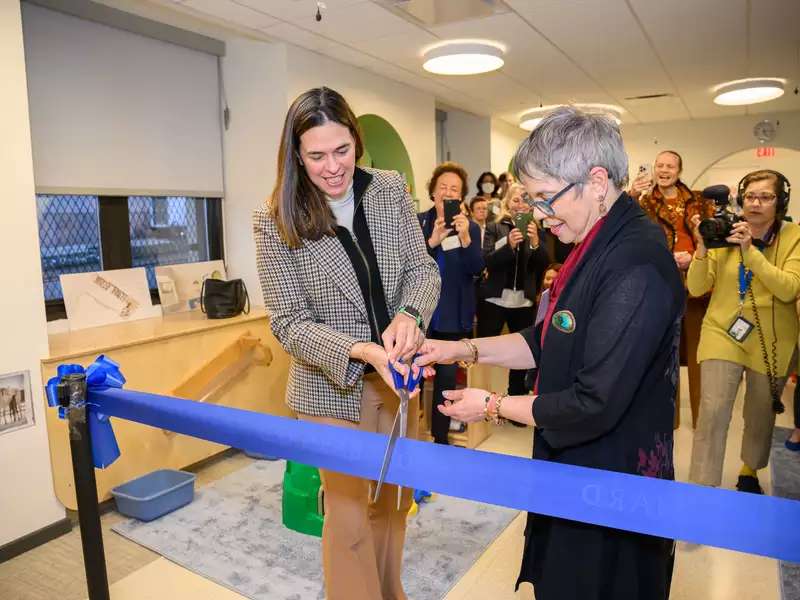 The Take Our Daughters And Sons To Work annual program enables children 8-18 to “discover the power and possibilities associated with a balanced work and family life,” according to the Take Our Daughters and Sons to Work Foundation.
The Take Our Daughters And Sons To Work annual program enables children 8-18 to “discover the power and possibilities associated with a balanced work and family life,” according to the Take Our Daughters and Sons to Work Foundation.
On this day, we turn to the “toddler whisperer,” Professor Tovah P. Klein, director of the Barnard College Center for Toddler Development (Toddler Center) and associate professor of psychology, who has spoken on everything child-centric, from managing tantrums to managing cell phone behavior. At the Toddler Center, she and her research team study children's social and emotional development and the influence of parents on children's development, including toddler memory, the role of children’s play in emotional development, and the experience of being a parent during a child’s early years. Klein, a mother of three, is the author of How Toddlers Thrive: What Parents Can Do Today for Children Ages 2 to 5 to Plant the Seeds of Lifelong Success and a frequent media contributor to outlets such as Live Science, Today, Motherly, and Business Insider.
Why is it important for children to actively see what their parents do for a living?
Children learn by being part of the adult world. In our society, we have a great divide between the work world of adults and the child’s world, which can mean that parents’ workplace is a mystery to the child. By seeing where the parent works, with whom they work, and the kind of work they do, it demystifies the parent’s work world for the child. For older children and teens, it can give them positive ideas about work for their future.
If a parent decides to participate in Take Our Children to Work Day, what should they consider to ensure a positive experience? Are there any do’s and don’ts?
Some workplaces will have activities set up for the day. See what the activities are and what your child can take part in prior to that day. That way, when the child arrives, the day is set up for them. Have a family photo in your office or work area, as the message to your child or teen is that family matters even when mom or dad is away at work. If your child has made something for you in the past (even if it is from many years prior) and it is on your desk, or on the wall, the child will also feel welcomed. Be sure meals are planned—when and where will the child eat? That is key to a successful day! And if there is a work task they can take part in (from making photocopies to doing a part of the work), have that planned out.
Do plan to get less work done that day. Do have a schedule or plan for the day.
Don’t expect your child (depending on age) to have a lot of downtime. They may want to “help” if there are tasks they can do, but they will need to be guided in what they can do.
What are some of the skills children can learn by spending time with a parent or guardian at work?
That very much depends on the kind of workplace they are visiting. I don’t see this opportunity so much about skill-building as I do about relationship-building. It connects the child in a focused way to the parent’s workplace: it helps them feel welcome there, it gives them a sense of the place where mom or dad go each day, and it gives them a window into what adults do at work. That helps them have an idea of their own future, but also a positive image of adult work. Then again, I learned to type over many visits to my parents’ workplace. I used to go to their university when my school was closed. One of the secretaries took me in and would give me “jobs” to type. I loved it!
How can parents get children interested in learning more about what they do for work?
It’s about having children see and experience the world of adults, which includes work, home, and school. For example, being responsible for walking the attendance list down to the school office, helping the plumber who is fixing the sink by holding their tools, asking questions about how pipes work together, or visiting a workplace and talking about what goes on there are all different ways of being in the adult work world.
Parents can share stories about something that happened at work in a child-friendly manner. They can talk about friends and colleagues at work, a project they worked on, or something good they accomplished or enjoyed doing. More than anything, it is the attitude a parent has about the work they do that can rub off on a child. Attitudes, such as a parent expressing their commitment to their work or that they value what they do, are conveyed to a child and create positive attitudes about the work world their child will one day enter. Visiting the workplace also introduces the child to the concrete aspects of where mommy or daddy works, who they work with, and what “tools” they use (computers, machines, or otherwise).
*Photo courtesy of Barnard Toddler Center
For more parenting advice from the “toddler whisperer,” follow Professor Klein on Twitter (@tovahklein) and Facebook (How Toddlers Thrive).
Professor Klein will speak in NYC on May 17 on "Moms in the Modern World: How to Crush It At Home and at Work."



